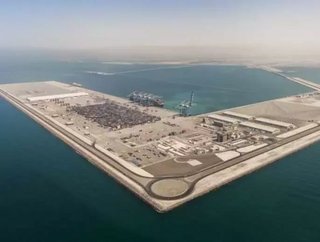Abu Dhabi Ports enjoy significant cargo growth

General cargo moving through Abu Dhabi’s commercial Ports has increased by 37% in the first six months of this year.
ADPC’s commercial ports of Musaffah, Khalifa and Zayed have handled 6.4 million freight tonnes (FT) of general cargo, compared to 4.7 million FT in the first half of 2014.
This is an increase of 1.74 million FT (freight tonnes) compared with the same period in 2013.
Captain Mohamed Juma Al Shamisi, CEO, ADPC said: “These figures show a strong first half of 2014 and indicate a promising six months ahead”
He added: “The volume of cargo moving through our ports is on the up. We expect that we will handle more than 12 million FT by the end of this year, compared to 9.5 million FT handled last year.”
While Abu Dhabi’s ongoing economic growth explains some of the increased volumes, another reason is ADPC’s work with key customers to consolidate and maximise their supply chain efficiencies. These include local and international businesses such as Emirates Aluminium (EMAL), Emirates Steel, Abu Dhabi National Oil Company (ADNOC) and Emirates Nuclear Energy Corporation (ENEC).
EMAL is the anchor tenant in the aluminium cluster of the Khalifa Industrial Zone Abu Dhabi (Kizad). The company has a purpose built wharf at Khalifa Port to shorten the supply chain of raw materials direct from sea to smelter.
EMAL and ADPC have also signed a ten year agreement contracting ADPC to handle all of the logistics involved in exporting high quality aluminium products from EMAL’s production site to more than 150 customers worldwide.
EMAL expects the volume of exported metal to increase from 600,000 tonnes in 2014, to more than 750,000 tonnes from 2015 onwards.
Another reason behind the growing import and export activities at Abu Dhabi’s commercial ports is the progress of several key infrastructure projects, which are requiring increased import and export volumes.
These include the midfield terminal at Abu Dhabi Airports, as well as the upcoming Louvre Museum Abu Dhabi, the Guggenheim Museum, and various building projects in the Western Region, many of which require specialized project cargo and increased volumes of building materials.
Against this backdrop, ADPC is enhancing its capacity for general and bulk cargo at Abu Dhabi Ports, with a special focus on Zayed Port.
After announcing an AED-20-million investment in essential maintenance work at Zayed Port and the Free Ports in March, ADPC is now remapping all of Zayed Port’s processes, and upgrading the port’s equipment and analysing its business efficiencies to meet cargo flows in the most efficient way.
As the master developer and regulator of ports and industrial zones in the Emirate of Abu Dhabi, ADPC's core objective is to facilitate the diversification of the economy by stimulating development and trade, following Abu Dhabi’s Economic Vision 2030.
ADPC manages nine commercial, logistics, community and leisure ports, including its flagship state-of-the-art, deep-water Khalifa Port. For more information, visit: http://www.adpc.ae/en/news/media-centre/press-releases/abu-dhabi-ports-experience-significant-cargo-growth.html
- Abu Dhabi Ports launches blockchain platform for imports and exportsTechnology
- Abu Dhabi to become first Gulf port to host world's largest vesselsLogistics
- Five of Qatar Airways fleet are on display this week at Le BourgetDigital Supply Chain
- Qatar Airways named best Middle Eastern/African airline for 6th consecutive yearProcurement






